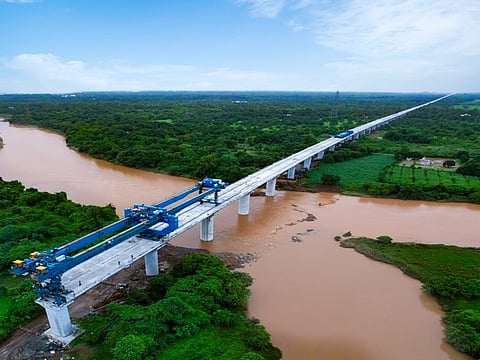

NEW DELHI: Like in Japan, the route for India’s first bullet train, currently under construction, has been designed to create a large and unified economic zone across the states it passes through.
The economic zones, which will be established once the bullet train services between Mumbai and Ahmedabad begin, are expected to yield economic benefits through industrialisation.
“The biggest advantage of the bullet train is that it brings together 5-6 cities to form a single economic zone,” Railway Minister Ashwini Vaishnaw recently said. “The bullet train project is not only a means of transportation, but it is a project for the growth of the entire region,” he added.
India’s first high-speed rail corridor, designed to accommodate bullet trains, is anticipated to give an economic boost to more than 12 cities along its route, and their smaller neighbouring towns through enhanced business and industrial activities.
Drawing a comparison to Japan’s first bullet train project, which created a significant hub between Osaka and Tokyo, Vaishnaw said, “As a result of Japan’s first bullet train, introduced between Osaka and Tokyo, all the six cities located along the route between these stations emerged as major hubs. Similarly, areas like Surat, Nadia, Bilimora, Vapi, Thane, Ahmedabad, and others along the Mumbai-Ahmedabad bullet train route will witness rapid growth.”
Providing an update on the progress of the project, the minister said 360 km of work is now at the viaduct level. “The work at the Anand bullet train station is progressing well, and it is being modernised to accommodate trains running at speeds of up to 350 km/h,” he added.
A senior railway official explained that the bullet train project is conservatively expected to multiply business activities across the regions between these two states by more than five times, with reduced travel times prioritising business movements.
It is also expected that the first bullet train project will lead to the creation of economic estates around major stations along the route, attracting substantial private sector investment in infrastructure.
“The high-speed rail development will stimulate construction, engineering, and manufacturing sectors, resulting in job creation and improved transportation networks. With travel time reduced from 7-8 hours to just 2-3- hours, day trips or business travel will become more viable,” said the senior railway official.
“The most significant economic impact will be felt through job creation, with an estimated 1 to 2 lakh jobs generated in construction for both skilled and unskilled labour, in addition to specialised technical roles,” the official added.